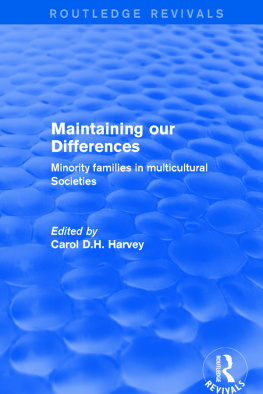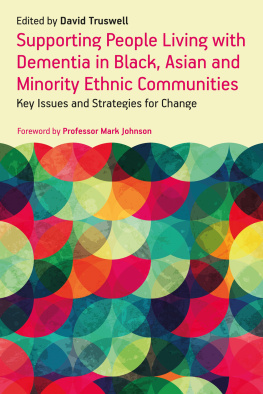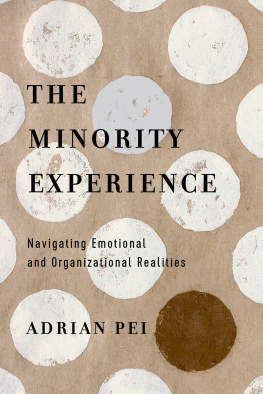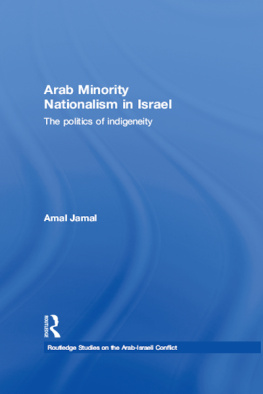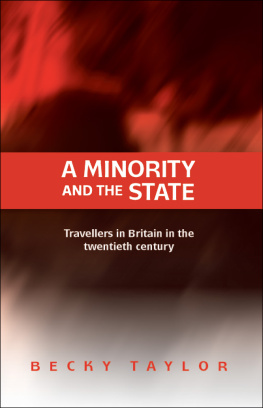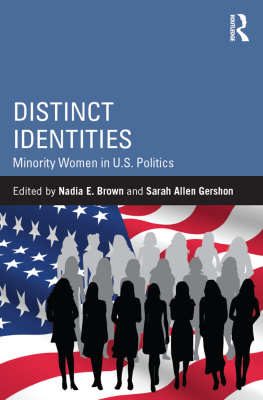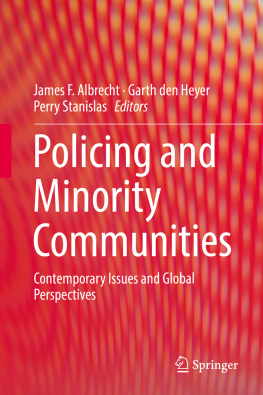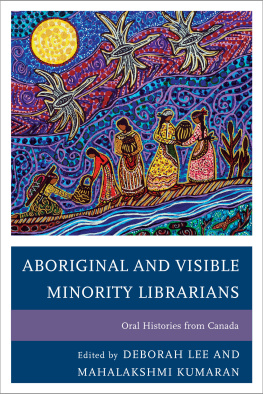MAINTAINING OUR DIFFERENCES
For Ray and Robert Hussa
Maintaining our Differences
Minority families in multicultural societies
Edited by
CAROL D.H. HARVEY
University of Manitoba, Canada
First published 2001 by Ashgate Publishing
Reissued 2018 by Routledge
2 Park Square, Milton Park, Abingdon, Oxon OX14 4RN
711 Third Avenue, New York, NY 10017, USA
Routledge is an imprint of the Taylor & Francis Group, an informa business
Copyright Carol D.H. Harvey 2001
All rights reserved. No part of this book may be reprinted or reproduced or utilised in any form or by any electronic, mechanical, or other means, now known or hereafter invented, including photocopying and recording, or in any information storage or retrieval system, without permission in writing from the publishers.
Notice:
Product or corporate names may be trademarks or registered trademarks, and are used only for identification and explanation without intent to infringe.
Publishers Note
The publisher has gone to great lengths to ensure the quality of this reprint but points out that some imperfections in the original copies may be apparent.
Disclaimer
The publisher has made every effort to trace copyright holders and welcomes correspondence from those they have been unable to contact.
A Library of Congress record exists under LC control number: 2001087938
ISBN 13: 978-1-138-63423-7 (hbk)
ISBN 13: 978-1-315-21208-1 (ebk)
Contents
John E. Peters
Fatima Husain and Margaret OBrien
Darren E. Sherkat
Susan C. Ziehl
Rachel Lawrenchuk and Carol D. H. Harvey
Carol D. H Harvey
Carol D. H. Harvey, Ph.D., is Professor, Department of Family Studies, Faculty of Human Ecology, University of Manitoba, Winnipeg, Canada. She is interested in family interaction, especially within minority groups.
Fatima Husain, Ph.D., worked as a Research Fellow at the University of North London, on a European Union project on Muslim Families. She is currently working as an independent research consultant.
Rachel Lawrenchuk is a Ph.D. student in the Department of Community Health Sciences, Faculty of Medicine, University of Manitoba. Her research interest is Aboriginal child and family education.
Margaret OBrien, formerly at the University of North London, is now with the School of Social Work and Psychosocial Studies at the University of East Anglia.
John E. Peters, Ph.D., is Professor, Department of Sociology and Anthropology, Development and International Studies, Wilfrid Laurier University, Waterloo, Ontario, Canada. In addition to studying Mennonites, he spent eight years in the Amazon of Brazil studying the Yanomani peoples.
Darren E. Sherkat, Ph.D., is Associate Professor, Sociology and Religious Studies, Vanderbilt University, Nashville, Tennessee, U.S.A. Much of his work examines religious change in the United States, with a particular emphasis on fundamentalism and African American religion.
Susan C. Ziehl, Ph.D., is Senior Lecturer, Department of Sociology and Industrial Sociology, Rhodes University, Grahamstown, South Africa. She studies the much-neglected question of culture and its impact on household formation.
The audiences at the Committee on Family Research (RC-06), of the International Sociological Associations XIV Congress in Montreal, held in July 1998, were treated to a series of papers by authors who have written of this book. The mechanisms by which minority families interact with the dominant cultures in which they live can now reach a wider audience.
Thank you to the authors of the chapters presented here. Your scholarship shows insight into minority and majority cultures. You were patient, helpful and co-operative.
The help of the University of Manitoba in providing time, space and equipment is appreciated. Securing the publisher was done while on sabbatical as a Research Associate, International Social Science Institute, University of Edinburgh, and I was generously given space and equipment while I was there.
Production assistance was given by Pauline Chambers, Ile-des-Chnes, Manitoba. Having a competent technical assistant is crucial; Paulines cheerful wit is a bonus.
Ashgate Publishing reaches many readers with its support of the social sciences and humanities. Special thanks to Sarah Markham, Anne Kierby, and others at Ashgate. You have been very helpful and professional.
Finally, my own family have provided inspiration and encouragement. My father, the late Arthur Hussa and my mother Ruth Hussa, showed me appreciation of people in many walks of life. My husband Mahlon understands the value of cultural diversity, and he was willing to commit help and money to see this book in print. Our daughters, son-in law, and granddaughter give joy and affection. I am indebted to all of you.
C. D. H. Harvey, Editor
CAROL D.H. HARVEY
Families who are part of a minority group within a dominant culture use various ways of maintaining their differences. In this collection researchers explore minority families in four countries. These families use the values of their religion to help define them and keep their subcultures alive. They are also influenced by the dominant cultures around them. Some of these minority families use distinctive dress or language, which also reinforce their separation from the dominant culture.
In the four countries where the research took place, Canada, the United States, the United Kingdom, and South Africa, are all multicultural. Although the social situations differ in these countries, they are all industrialised, and to varying degrees, are democracies whose people hold post-modern values. The dominant language spoken is English, and, although sometimes in a statistical minority, the power brokers are white. The five minority cultures all begin life with another language and are introduced to English later, generally in school.
Old Order Mennonites in Canada were studied by John Peters, Pakistanis in Great Britain by Fatima Husain and Margaret OBrien, conservative Christians in the United States by Darren Sherkat, Afrikaaners and whites in South Africa by Susan Ziehl, and Cree and Ojibway in Canada by Rachel Lawrenchuk and myself.
First, John Peters of Wilfred Laurier University in Canada uses an ethnographic, developmental approach to study Old Order Mennonites. These conservative Christian families are farmers and pacifists. Value is placed on a peaceful, rural way of living. Parents try to find money to establish their adult sons in farming. Roles of men and women are prescribed, and use of many technological tools is prohibited. When speaking Low German, wearing distinctive clothing, or driving their horses and buggies along the roadways, the Older Order Mennonites choose a family life much different from their neighbours.
Second, Fatima Husain and Margaret O'Brien, from the University of North London in the United Kingdom, studied religion, family and community among Pakistanis in Britain. Using government statistics, research reports, and media information the authors show a changing pattern of family and community life. Religion has become more important to the Pakistanis in Britain as family and community ties to Pakistan have become weaker over time. The authors make suggestions for British governmental policy to assist Pakistani accommodation to the dominant culture. They also show the importance of religion to define values and to help families maintain a sense of community.

